September 2006
Black Diamond launches first rugged UMPC
 On September 26, at the Embedded Systems Conference, Black Diamond Advanced Technologylaunched the Switchback PC, the world's first rugged UMPC (Ultra Mobile PC). The company describes the 7.5 x 5.5 x 2 inch device as the next generation of rugged computing systems, sort of a "Toughbook that fits into pant pockets." While the Switchback PC follows the general Microsoft "Origami" UMPC platform, it clearly addresses an entirely different market. An integrated hardware keyboard makes data entry easier, the device uses a modular backend (hence the name "Switchback") to provide customized capabilities for different clients, and IP67 sealing and a 6-foot drop spec show that this is a computer for serious jobs. But there is more: Black Diamond plans on releasing the Switchbaack with not only a 1 GHz Celeron M processor to run Windows XP, the UMPC version, or even Linux, but also a secondary processor on its own board that runs Windows Mobile, similar to what DualCor had planned for its dual-platform device. Our take: We've felt from the start that the UMPC platform was uniquely suited for rugged applications and have been waiting for such an implementation. If Black Diamond can deliver on its ambitious plans, this may well set a new trend in rugged mobile computing. -- Posted Friday, September 29, 2006
On September 26, at the Embedded Systems Conference, Black Diamond Advanced Technologylaunched the Switchback PC, the world's first rugged UMPC (Ultra Mobile PC). The company describes the 7.5 x 5.5 x 2 inch device as the next generation of rugged computing systems, sort of a "Toughbook that fits into pant pockets." While the Switchback PC follows the general Microsoft "Origami" UMPC platform, it clearly addresses an entirely different market. An integrated hardware keyboard makes data entry easier, the device uses a modular backend (hence the name "Switchback") to provide customized capabilities for different clients, and IP67 sealing and a 6-foot drop spec show that this is a computer for serious jobs. But there is more: Black Diamond plans on releasing the Switchbaack with not only a 1 GHz Celeron M processor to run Windows XP, the UMPC version, or even Linux, but also a secondary processor on its own board that runs Windows Mobile, similar to what DualCor had planned for its dual-platform device. Our take: We've felt from the start that the UMPC platform was uniquely suited for rugged applications and have been waiting for such an implementation. If Black Diamond can deliver on its ambitious plans, this may well set a new trend in rugged mobile computing. -- Posted Friday, September 29, 2006
RIM has spectacular second quarter
Reuter reports that BlackBerry maker RIM greatly exceeded investor and analyst expectations with its second-quarter results, showing strong subscriber growth for the future and boosting its stock. RIM reported a net profit of $140.8 million compared with a profit of $111 million for the same period last year. Revenue was $658.5 million, up from $490 million in the same period last year. Part of the rising stock may be market reaction to RIM's new multimedia-heavy BlackBerry Pearl, that was launched earlier this month through T-Mobile in the US. The Pearl adds music and camera functions to the wireless BlackBerry email capabilities and is aimed at a broader consumer market as opposed to the corporate clients RIM has focused on up to now. -- Posted Friday, September 29, 2006
Another look at the Toshiba M400 tablet convertible
Our intrepid contributor Tim Hillebrand takes another look at Toshiba's remarkable Portege M400, and likes it a lot. Read his full report on the M400. -- Posted Thursday, September 28, 2006
BlackBerry service - not just on RIM devices anymore
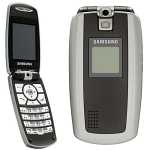 Samsung and T-Mobile announced the Samsung SGH-t719 slim flip phone with integrated BlackBerry Connect software and a compact, QWERTY-like keyboard for speedy word predictive text entry. The t719 features voice-activated dialing, Bluetooth, a swivel-lens 1.3 megapixel camera with video capture, MP4 and 3GP video player, instant and advanced messaging. It supports GSM 850, 900, 1800, 1900 MHz, measures 3.78" x 2.05" x 0.72", weighs 3.5 ounces, and has a 2.2" diagonal 176x220 pixel primary display. What we're seeing, basically, is that BlackBerry functionality is now coming to cellphones.
Samsung and T-Mobile announced the Samsung SGH-t719 slim flip phone with integrated BlackBerry Connect software and a compact, QWERTY-like keyboard for speedy word predictive text entry. The t719 features voice-activated dialing, Bluetooth, a swivel-lens 1.3 megapixel camera with video capture, MP4 and 3GP video player, instant and advanced messaging. It supports GSM 850, 900, 1800, 1900 MHz, measures 3.78" x 2.05" x 0.72", weighs 3.5 ounces, and has a 2.2" diagonal 176x220 pixel primary display. What we're seeing, basically, is that BlackBerry functionality is now coming to cellphones.
-- Posted Wednesday, September 27, 2006
Full review of the Hammerhead Xtreme
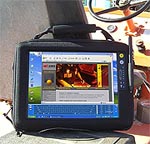 RuggedPCReview presents a full analysis of the DRS Tactical/WalkAbout Hammerhead Xtreme. This is the 8th generation of one of the rugged computing industry's most respected designs, now with updated technology and running the Windows XP Tablet PC Edition 2005. The Hammerhead started life well over a decade ago as a tablet milled from a solid block of metal. It still is. What has changed since then, and is the Hammerhead still at the forefront of rugged machinery for computing in extreme environments? -- Posted Tuesday, September 26, 2006
RuggedPCReview presents a full analysis of the DRS Tactical/WalkAbout Hammerhead Xtreme. This is the 8th generation of one of the rugged computing industry's most respected designs, now with updated technology and running the Windows XP Tablet PC Edition 2005. The Hammerhead started life well over a decade ago as a tablet milled from a solid block of metal. It still is. What has changed since then, and is the Hammerhead still at the forefront of rugged machinery for computing in extreme environments? -- Posted Tuesday, September 26, 2006
ExpressCard replacing PC Card
In the very first issue of Pen, we ran a feature on PCMCIA, those impossibly small cards that provided memory and other expansion to pen computers and PDAs. Today, PC Cards look huge and have largely been replaced. The PCMCIA itself has developed the ExpressCard standard to carry forward the benefits of 'plug-in' I/O cards to the next generation of personal computing devices, and announced that major notebook vendors have embraced ExpressCard technology as the modular expansion standard for their notebook systems. ExpressCard technology (see expresscard.org) is a high-performance, hardware expansion standard for mobile computers and replaces the current PC Card Standard. PC Card technology is the hardware expansion standard for more than 95 percent of all notebook computers Currently selling notebook computers with ExpressCard slots are Acer, Alienware, Apple, ASUS Computer, Averatec, Dell, Evesham, Fujitsu/Fujitsu Siemens, Itronix, HP, Lenovo, LG Electronics, Mouse Computer, MSI, PC-Koubou, Sony and Toshiba. -- Posted Tuesday, September 26, 2006
Nokia unveils all-in-one multimedia devices
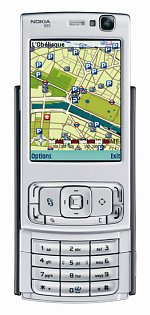 Nokia announced new devices and that show how the boundaries are blurring between the Internet, mobility and the consumer electronics industry by combining connectivity with cutting edge mobile technology. "Nokia Nseries multimedia computers represent the next leap forward in personal computing," said Anssi Vanjoki, executive vice president and general manager of Multimedia, Nokia. "In particular, the Nokia N95 is the evolution of what computers have now become; pocketable devices with the power to connect you to the information, services, content and other people you want when it suits your needs. This is the fastest growing segment in the mobile space and this year alone, we have already sold more than 10 million Nokia Nseries multimedia computers." The Nokia N95, an all-in-one multimedia computer with a pioneering dual slide concept, integrated GPS functionality, a 5 megapixel camera and support for high-speed mobile networks, makes it easier to watch and record videos, listen to songs, take high-quality photos, browse the internet, or catch up on email whenever you want. The Nokia N95 also includes integrated GPS and the Maps application with country, region and world maps that allow users to explore the world, find specific routes or locate services such as restaurants and hotels in more than 100 countries. -- Posted Tuesday, September 26, 2006
Nokia announced new devices and that show how the boundaries are blurring between the Internet, mobility and the consumer electronics industry by combining connectivity with cutting edge mobile technology. "Nokia Nseries multimedia computers represent the next leap forward in personal computing," said Anssi Vanjoki, executive vice president and general manager of Multimedia, Nokia. "In particular, the Nokia N95 is the evolution of what computers have now become; pocketable devices with the power to connect you to the information, services, content and other people you want when it suits your needs. This is the fastest growing segment in the mobile space and this year alone, we have already sold more than 10 million Nokia Nseries multimedia computers." The Nokia N95, an all-in-one multimedia computer with a pioneering dual slide concept, integrated GPS functionality, a 5 megapixel camera and support for high-speed mobile networks, makes it easier to watch and record videos, listen to songs, take high-quality photos, browse the internet, or catch up on email whenever you want. The Nokia N95 also includes integrated GPS and the Maps application with country, region and world maps that allow users to explore the world, find specific routes or locate services such as restaurants and hotels in more than 100 countries. -- Posted Tuesday, September 26, 2006
Sony launches 2.8 lbs EV-DO enabled Vaios
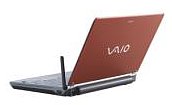 Sony released the first ultra-portable notebook, the 2.8-pounds Vaio VGN-TXN10 series, that includes Sprint broadband-capable wide area networking. This way, the new Vaios can use Bluetooth and 802.11b/g inside and in hotspots, and WWAN to the Sprint network when traveling outside of reach. Once EV-DO Rev. A becomes universally available in 2007, that will mean 450-800 kbps download speed. The new Vaois use a carbon fiber chassis, are less than an inch thick, use an Intel Core Solo, are Vista ready, and run between five and 11 hours on a charge. They have a 11.1-inch widescreen display, a DVD+R double layer/DVD+/-RW drive, come in charcoal, platinum, sienna and slate blue. And may well usher in an era where internt access for notebooks and handhelds will add another $50-100/month to our bills. -- Posted Tuesday, September 26, 2006
Sony released the first ultra-portable notebook, the 2.8-pounds Vaio VGN-TXN10 series, that includes Sprint broadband-capable wide area networking. This way, the new Vaios can use Bluetooth and 802.11b/g inside and in hotspots, and WWAN to the Sprint network when traveling outside of reach. Once EV-DO Rev. A becomes universally available in 2007, that will mean 450-800 kbps download speed. The new Vaois use a carbon fiber chassis, are less than an inch thick, use an Intel Core Solo, are Vista ready, and run between five and 11 hours on a charge. They have a 11.1-inch widescreen display, a DVD+R double layer/DVD+/-RW drive, come in charcoal, platinum, sienna and slate blue. And may well usher in an era where internt access for notebooks and handhelds will add another $50-100/month to our bills. -- Posted Tuesday, September 26, 2006
BusinessWeek launches free wap-based mobile edition
In response to the growing demand for sophisticated and relevant content for mobile devices such as smartphones, PDAs and other handheld computers, BusinessWeek is launching a new portable-electronic content delivery product, BusinessWeek Mobile Edition. Starting today, all of the high-quality content readers have come to expect from BusinessWeek will now be available free of charge at www.businessweek.mobi. -- Posted Monday, September 25, 2006
HP: It's a mad, mad, mad world
As technologists and gadget enthusiasts, the politics that drive the high tech industry can sure be infuriating. I mean, once we had Digital Equipment Corporation, nipping at the heels of mighty IBM. Well, they collapsed and were bought by then mighty Compaq, makers of the best Pocket PC ever, the iPAQ, and prior to that by the incredible Compaq Concerto pen convertible. So then Compaq decides to commit corporate suicide by selling itself to HP and live on only as a badge on low-cost PCs. HP first releases a flurry of iPAQs, then essentially abandons the line. Then the world is treated to the Carly Fiorina era, and now HP mostly makes headline for who spied on who and how, resulting in the ouster of its chairwoman, Patricia Dunn, and increasing heat on CEO and now chairman Mark Hurd. This is by no means an Enron, but, please, let's go back to making exciting technology! -- Posted Monday, September 25, 2006
Need a Mac with a touch screen?
You can get almost any Mac with a touch screen, just not from Apple. A company named Troll Touch retrofits your Mac with an analog resistive touch screen if you send it to them. -- Posted Monday, September 25, 2006
Lower cost UMPC
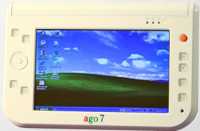 Mobile computing company agopc today announced a new lower price for its 1GHz VIA C7M-equipped ago7 Ultra-Mobile Personal Computer (UMPC). Available exclusively on its website, http://www.agopc.com/, the 512MB RAM/40GB HDD ago7 model is $799 plus shipping. "At agopc our mission is to broaden the UMPC's appeal," says President and CEO David Carroll. "At this price point, those new to the platform will find a high quality UMPC like ago7 very attractive." Mr. Carroll noted that ago7 now costs nearly $200 less than an identically configured model from their competition. -- Posted Thursday, September 21, 2006
Mobile computing company agopc today announced a new lower price for its 1GHz VIA C7M-equipped ago7 Ultra-Mobile Personal Computer (UMPC). Available exclusively on its website, http://www.agopc.com/, the 512MB RAM/40GB HDD ago7 model is $799 plus shipping. "At agopc our mission is to broaden the UMPC's appeal," says President and CEO David Carroll. "At this price point, those new to the platform will find a high quality UMPC like ago7 very attractive." Mr. Carroll noted that ago7 now costs nearly $200 less than an identically configured model from their competition. -- Posted Thursday, September 21, 2006
Motorola buys Symbol
Motorola and Symbol Technologies announced today "that the two companies have signed a definitive merger agreement, under which Motorola has agreed to acquire all of the outstanding shares of Symbol for $15 per share in cash. The transaction has a total equity value of approximately $3.9 billion on a fully-diluted basis. ... Upon completion of the transaction, Symbol will become a wholly owned subsidiary of Motorola and will be the cornerstone of Motorola's Networks and Enterprise business. Motorola intends to maintain Symbol's Holtsville, N.Y. headquarters, which will be the core of Motorola's global enterprise mobility business and serve as a center of excellence." Our take: We regret this development. In such "mergers" the smaller company almost always gets absorbed. Symbol, for decades, has been a (at times perhaps too) feisty innovator and competitor with a very well defined indentity and a lineup of terrific products. This development may well work just fine, but we mourn the loss of Symbol as an independent company. [read press release] -- Posted Tuesday, September 19, 2006
Panasonic introduces three new "business-rugged" Toughbooks
Panasonic introduced three new "business-rugged" Toughbooks: The ultraportable CF-W5, tablet alternative CF-T5, and the thin-and-light desktop replacement CF-Y5. The new models aim for durability, lightweight and maximum reliability by using magnesium alloy cases, flexible internal connectors and shock-mounted and removable hard drives. "Business-rugged" means they withstand a one foot drop. The notebooks will ship with optional integrated radio modems to access to the EV-DO networks of Sprint or Verizon or UMTS/HSDPA-based solutions from Cingular Wireless. The Toughbook W5 has an integrated DVD/CD-RW combo drive, 12.1 inch anti-glare LCD, weighs 3.1 pounds, and uses an ultra-low voltage Intel Core Solo processor with battery life of more than eight hours. The Toughbook T5, named a "Tablet PC Alternative" has a 12.1 inch touch-screen LCD, image rotation software, an ergonomic hand strap, and a weight of 3.5 pounds. The Toughbook Y5 has a 14.1 inch display, weighs 3.7 pounds, has six hours of battery life, a built-in DVD/CD-RW optical drive, Core Duo, and multiple wireless connectivity options and is essentially a lightweight desktop replacement. -- Posted Thursday, September 14, 2006
Palm launches Palm Developer Network (PDN)
Palm unveiled the Palm Developer Network (PDN), the first formal developer program to include both Palm OS and Microsoft Windows Mobile Pocket PC developers. The new program provides focused technical, business and marketing support, and replaces Palm's prior developer program, PluggedIn. New services include a support library to answer developer questions, and a "Designed For Palm Products” compatibility test and logo program to help validate that the mobile solutions are compatible with Palm devices. -- Posted Wednesday, September 13, 2006
Intermec releases small, rugged CN3 WinMo 5.0 handheld
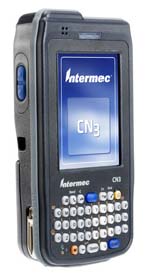 Intermec introduced the CN3, at 6.3 x 3.4 x 1.2 inches perhaps the smallest rugged mobile computer in the world. The CN3 features voice and high-speed data communications capabilities via Bluetooth, 3G WAN (either GSM/EDGE or CDMA/EV-DO) and Cisco-compatible WiFi, has integrated GPS and a choice between area imager and a 1.3 megapixel camera. This means the CN3 can scan and decode any kind of barcode or capture still images, such as signatures or video images that can be stored for later use or sent immediately anywhere in the world. The overall idea is to replace the mobile worker's cell phone, GPS unit, pager, laptop, camera with a single device. Mapping software can provide turn-by-turn directions for direct package delivery, direct store delivery and to guide field service personnel to their destinations. The CN3 uses Microsoft Windows Mobile 5.0 with the Messaging and Security Feature Pack, including Direct Push Technology for wireless email. It has a QWERTY keyboard or an optional numeric keypad, 128 MB RAM, a 2D imager for scanning bar codes and a full-shift battery, all housed in a rugged case that is rain and dust resistant. -- Posted Tuesday, September 12, 2006
Intermec introduced the CN3, at 6.3 x 3.4 x 1.2 inches perhaps the smallest rugged mobile computer in the world. The CN3 features voice and high-speed data communications capabilities via Bluetooth, 3G WAN (either GSM/EDGE or CDMA/EV-DO) and Cisco-compatible WiFi, has integrated GPS and a choice between area imager and a 1.3 megapixel camera. This means the CN3 can scan and decode any kind of barcode or capture still images, such as signatures or video images that can be stored for later use or sent immediately anywhere in the world. The overall idea is to replace the mobile worker's cell phone, GPS unit, pager, laptop, camera with a single device. Mapping software can provide turn-by-turn directions for direct package delivery, direct store delivery and to guide field service personnel to their destinations. The CN3 uses Microsoft Windows Mobile 5.0 with the Messaging and Security Feature Pack, including Direct Push Technology for wireless email. It has a QWERTY keyboard or an optional numeric keypad, 128 MB RAM, a 2D imager for scanning bar codes and a full-shift battery, all housed in a rugged case that is rain and dust resistant. -- Posted Tuesday, September 12, 2006
i-mate announces two new WinMo 5.0 devices
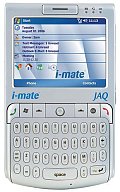
 i-mate announced two new devices for distribution in the U.S., Latin America and Canada. The i-mate JAQ is a quad-band Windows Mobile 5.0 device, running on a 200MHz OMAP 850 processor. It has a full QWERTY keyboard, 128 MB ROM/64MB RAM, 64k 2.8" color LCD screen, MiniSD memory card expansion, integrated antenna, and Bluetooth. The i-mate SPL, apparently made by Chinese ODM TechFaith Wireless, is a stylish Windows Mobile GSM/GPRS tri-band device with 128MB ROM/64MB RAM, a 64k 2.2" color LCD screen, MiniSD memory card expansion, integrated antenna and Bluetooth. -- Posted Tuesday, September 12, 2006
i-mate announced two new devices for distribution in the U.S., Latin America and Canada. The i-mate JAQ is a quad-band Windows Mobile 5.0 device, running on a 200MHz OMAP 850 processor. It has a full QWERTY keyboard, 128 MB ROM/64MB RAM, 64k 2.8" color LCD screen, MiniSD memory card expansion, integrated antenna, and Bluetooth. The i-mate SPL, apparently made by Chinese ODM TechFaith Wireless, is a stylish Windows Mobile GSM/GPRS tri-band device with 128MB ROM/64MB RAM, a 64k 2.2" color LCD screen, MiniSD memory card expansion, integrated antenna and Bluetooth. -- Posted Tuesday, September 12, 2006
Nokia releases Symbian-based E62 smartphone
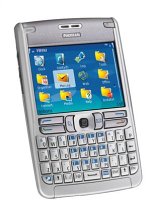 Cingular Wireless and Nokia introduced the Symbian 9.1-based Nokia E62 device built specifically for wireless email. It measures 4.6 x 2.75 x 0.63 inches, a bit larger than a Treo, has a full QWERTY keyboard, a 2.8-inch 320 x 240 display, Bluetooth, a miniSD slot, 90MB of memory, but no WiFi. Nokia E62 users have a variety of secure email platforms from which to choose: Good Mobile Messaging, Cingular Xpress Mail, BlackBerry Connect, Mail for Exchange, the Nokia push solution via Intellisync Mobile Suite from Nokia, and standard clients such as POP3, IMAP and SMTP. In addition, the device includes a pre-loaded instant messaging application. -- Posted Tuesday, September 12, 2006
Cingular Wireless and Nokia introduced the Symbian 9.1-based Nokia E62 device built specifically for wireless email. It measures 4.6 x 2.75 x 0.63 inches, a bit larger than a Treo, has a full QWERTY keyboard, a 2.8-inch 320 x 240 display, Bluetooth, a miniSD slot, 90MB of memory, but no WiFi. Nokia E62 users have a variety of secure email platforms from which to choose: Good Mobile Messaging, Cingular Xpress Mail, BlackBerry Connect, Mail for Exchange, the Nokia push solution via Intellisync Mobile Suite from Nokia, and standard clients such as POP3, IMAP and SMTP. In addition, the device includes a pre-loaded instant messaging application. -- Posted Tuesday, September 12, 2006
BlackBerry 8703e for Verizon Wireless
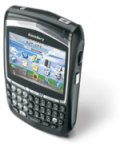 Verizon Wireless and RIM introduced the new BlackBerry 8703e operating on Verizon’s Evolution-Data Optimized (EV-DO) network. The BlackBerry 8703e integrates advanced device hardware, software and network technologies in a powerful handset with a full 35-key QWERTY keyboard. The BlackBerry 8703e combines “push” e-mail, Web browsing and other mobile data applications together with premium mobile phone features including dedicated phone keys, smart dialing, conference calling, speed dialing, call forwarding, built-in speakerphone for conference calls and hands-free use and Bluetooth support for use with headsets and car kits. -- Posted Tuesday, September 12, 2006
Verizon Wireless and RIM introduced the new BlackBerry 8703e operating on Verizon’s Evolution-Data Optimized (EV-DO) network. The BlackBerry 8703e integrates advanced device hardware, software and network technologies in a powerful handset with a full 35-key QWERTY keyboard. The BlackBerry 8703e combines “push” e-mail, Web browsing and other mobile data applications together with premium mobile phone features including dedicated phone keys, smart dialing, conference calling, speed dialing, call forwarding, built-in speakerphone for conference calls and hands-free use and Bluetooth support for use with headsets and car kits. -- Posted Tuesday, September 12, 2006
New wireless AvantGo for Blackberry subscribers
Sybase iAnywhere unveiled the next generation of the AvantGo mobile Internet service, featuring a fully-enhanced wireless experience that enables smartphone and PDA users to have always available access to their favorite Web content. The beta program for Research In Motion BlackBerry users opened today, giving users the opportunity to take the new service for a test-drive. Additional platforms will be announced in the months to come. -- Posted Tuesday, September 12, 2006
McAfee releases VirusScan Mobile for WinMo 5.0
McAfee, Inc. today announced that McAfee VirusScan Mobile and McAfee VirusScan Mobile Enterprise Edition are now available for the Windows Mobile 5.0 platform. The announcement broadens the scope of platforms protected by McAfee's mobile security software, and helps protect users of Windows Mobile 5.0 against the latest malware and attacks, including recent SMiShing attacks (phishing scams via SMS). [see McAfee mobile site]
-- Posted Monday, September 11, 2006
Digital signature capability on Blackberry
Standard Register's ExpeData Digital Solutions group now offers digital signature capability for BlackBerry via an ISV toolkit that can integrate the capability into BlackBerry-based applications, enabling mobile workers to capture digital signatures and route them wirelessly to back-end systems. The ExpeData solution enables mobile workers to obtain a signature on paper, using a special ballpoint pen. The signature is also captured electronically by the pen and transmitted via Bluetooth to the BlackBerry. Images of the signature are viewable on the BlackBerry screen and a record of the date and time associated with the signature is created. The ExpeData toolkit -- comprised of a Logitech digital pen and pocket-sized digital paper pad -- allows for convenient and cost-effective signature capture, utilizing Anoto functionality. -- Posted Wednesday, September 6, 2006
Treo 700wx for Sprint debuts
Palm announced the availability of the Treo 700wx smartphone running Windows Mobile 5.0 Pocket PC Phone Edition, adding another Palm EvDO product to Sprint's product offerings and marking the availability of Sprint's first Windows Mobile Treo smartphone on the Sprint Power Vision. The 700wx joins the initial 700w that used the Verizon Wireless phone service. Our take: It totally bites that hardware platforms increasingly have to conform to proprietary phone company services and offerings. All this means is that the device makers are losing the war to the phone companies that increasingly dictate what consumers can and cannot do with their devices, and at what price for each additional "service." -- Posted Wednesday, September 6, 2006
Cellphone deluge
According to Digitimes, China alone made almost 245 million GSM and CDMA handsets during January-July of 2006, a growth of 61% over the same period last year. The statistics, published by China's Ministry of Information Industry, speak for themselves: it's all cellphones these days, by the billions, and while not all are "smart," most are to some degree, at least in ways that allow the carriers to charge for numerous extra services. -- Posted Tuesday, September 5, 2006
Handheld gaming system powered by Symbol
Sona Mobile Holdings Corp. announced the signing of an OEM agreement supporting the development of a secure wireless handheld gaming system with Symbol Technologies. As part of the agreement, Symbol will provide a complete wireless solution, including Wi-Fi infrastructure, network management, professional services, and privately labeled MC70 Enterprise Digital Assistants to the wireless gaming alliance, founded by Shuffle Master, Inc. and Sona Mobile Holdings Corp. "Symbol's technology and worldwide support network greatly enhances the strength of our emerging Casino On Demand initiative," said Paul C. Meyer, Shuffle Master President and Chief Operating Officer. "We are confident that our combined efforts will produce the gaming industry's premier wireless and mobile content product." -- Posted Tuesday, September 5, 2006
 Samsung and T-Mobile announced the Samsung SGH-t719 slim flip phone with integrated BlackBerry Connect software and a compact, QWERTY-like keyboard for speedy word predictive text entry. The t719 features voice-activated dialing, Bluetooth, a swivel-lens 1.3 megapixel camera with video capture, MP4 and 3GP video player, instant and advanced messaging. It supports GSM 850, 900, 1800, 1900 MHz, measures 3.78" x 2.05" x 0.72", weighs 3.5 ounces, and has a 2.2" diagonal 176x220 pixel primary display. What we're seeing, basically, is that BlackBerry functionality is now coming to cellphones.
Samsung and T-Mobile announced the Samsung SGH-t719 slim flip phone with integrated BlackBerry Connect software and a compact, QWERTY-like keyboard for speedy word predictive text entry. The t719 features voice-activated dialing, Bluetooth, a swivel-lens 1.3 megapixel camera with video capture, MP4 and 3GP video player, instant and advanced messaging. It supports GSM 850, 900, 1800, 1900 MHz, measures 3.78" x 2.05" x 0.72", weighs 3.5 ounces, and has a 2.2" diagonal 176x220 pixel primary display. What we're seeing, basically, is that BlackBerry functionality is now coming to cellphones. On September 26, at the Embedded Systems Conference, Black Diamond Advanced Technologylaunched the Switchback PC, the world's first rugged UMPC (Ultra Mobile PC). The company describes the 7.5 x 5.5 x 2 inch device as the next generation of rugged computing systems, sort of a "Toughbook that fits into pant pockets." While the Switchback PC follows the general Microsoft "Origami" UMPC platform, it clearly addresses an entirely different market. An integrated hardware keyboard makes data entry easier, the device uses a modular backend (hence the name "Switchback") to provide customized capabilities for different clients, and IP67 sealing and a 6-foot drop spec show that this is a computer for serious jobs. But there is more: Black Diamond plans on releasing the Switchbaack with not only a 1 GHz Celeron M processor to run Windows XP, the UMPC version, or even Linux, but also a secondary processor on its own board that runs Windows Mobile, similar to what DualCor had planned for its dual-platform device. Our take: We've felt from the start that the UMPC platform was uniquely suited for rugged applications and have been waiting for such an implementation. If Black Diamond can deliver on its ambitious plans, this may well set a new trend in rugged mobile computing. -- Posted Friday, September 29, 2006
On September 26, at the Embedded Systems Conference, Black Diamond Advanced Technologylaunched the Switchback PC, the world's first rugged UMPC (Ultra Mobile PC). The company describes the 7.5 x 5.5 x 2 inch device as the next generation of rugged computing systems, sort of a "Toughbook that fits into pant pockets." While the Switchback PC follows the general Microsoft "Origami" UMPC platform, it clearly addresses an entirely different market. An integrated hardware keyboard makes data entry easier, the device uses a modular backend (hence the name "Switchback") to provide customized capabilities for different clients, and IP67 sealing and a 6-foot drop spec show that this is a computer for serious jobs. But there is more: Black Diamond plans on releasing the Switchbaack with not only a 1 GHz Celeron M processor to run Windows XP, the UMPC version, or even Linux, but also a secondary processor on its own board that runs Windows Mobile, similar to what DualCor had planned for its dual-platform device. Our take: We've felt from the start that the UMPC platform was uniquely suited for rugged applications and have been waiting for such an implementation. If Black Diamond can deliver on its ambitious plans, this may well set a new trend in rugged mobile computing. -- Posted Friday, September 29, 2006 RuggedPCReview presents a full analysis of the DRS Tactical/WalkAbout
RuggedPCReview presents a full analysis of the DRS Tactical/WalkAbout  Nokia announced new devices and that show how the boundaries are blurring between the Internet, mobility and the consumer electronics industry by combining connectivity with cutting edge mobile technology. "Nokia Nseries multimedia computers represent the next leap forward in personal computing," said Anssi Vanjoki, executive vice president and general manager of Multimedia, Nokia. "In particular, the Nokia N95 is the evolution of what computers have now become; pocketable devices with the power to connect you to the information, services, content and other people you want when it suits your needs. This is the fastest growing segment in the mobile space and this year alone, we have already sold more than 10 million Nokia Nseries multimedia computers." The Nokia N95, an all-in-one multimedia computer with a pioneering dual slide concept, integrated GPS functionality, a 5 megapixel camera and support for high-speed mobile networks, makes it easier to watch and record videos, listen to songs, take high-quality photos, browse the internet, or catch up on email whenever you want. The Nokia N95 also includes integrated GPS and the Maps application with country, region and world maps that allow users to explore the world, find specific routes or locate services such as restaurants and hotels in more than 100 countries. -- Posted Tuesday, September 26, 2006
Nokia announced new devices and that show how the boundaries are blurring between the Internet, mobility and the consumer electronics industry by combining connectivity with cutting edge mobile technology. "Nokia Nseries multimedia computers represent the next leap forward in personal computing," said Anssi Vanjoki, executive vice president and general manager of Multimedia, Nokia. "In particular, the Nokia N95 is the evolution of what computers have now become; pocketable devices with the power to connect you to the information, services, content and other people you want when it suits your needs. This is the fastest growing segment in the mobile space and this year alone, we have already sold more than 10 million Nokia Nseries multimedia computers." The Nokia N95, an all-in-one multimedia computer with a pioneering dual slide concept, integrated GPS functionality, a 5 megapixel camera and support for high-speed mobile networks, makes it easier to watch and record videos, listen to songs, take high-quality photos, browse the internet, or catch up on email whenever you want. The Nokia N95 also includes integrated GPS and the Maps application with country, region and world maps that allow users to explore the world, find specific routes or locate services such as restaurants and hotels in more than 100 countries. -- Posted Tuesday, September 26, 2006 Sony released the first ultra-portable notebook, the 2.8-pounds Vaio VGN-TXN10 series, that includes Sprint broadband-capable wide area networking. This way, the new Vaios can use Bluetooth and 802.11b/g inside and in hotspots, and WWAN to the Sprint network when traveling outside of reach. Once EV-DO Rev. A becomes universally available in 2007, that will mean 450-800 kbps download speed. The new Vaois use a carbon fiber chassis, are less than an inch thick, use an Intel Core Solo, are Vista ready, and run between five and 11 hours on a charge. They have a 11.1-inch widescreen display, a DVD+R double layer/DVD+/-RW drive, come in charcoal, platinum, sienna and slate blue. And may well usher in an era where internt access for notebooks and handhelds will add another $50-100/month to our bills. -- Posted Tuesday, September 26, 2006
Sony released the first ultra-portable notebook, the 2.8-pounds Vaio VGN-TXN10 series, that includes Sprint broadband-capable wide area networking. This way, the new Vaios can use Bluetooth and 802.11b/g inside and in hotspots, and WWAN to the Sprint network when traveling outside of reach. Once EV-DO Rev. A becomes universally available in 2007, that will mean 450-800 kbps download speed. The new Vaois use a carbon fiber chassis, are less than an inch thick, use an Intel Core Solo, are Vista ready, and run between five and 11 hours on a charge. They have a 11.1-inch widescreen display, a DVD+R double layer/DVD+/-RW drive, come in charcoal, platinum, sienna and slate blue. And may well usher in an era where internt access for notebooks and handhelds will add another $50-100/month to our bills. -- Posted Tuesday, September 26, 2006 Mobile computing company agopc today announced a new lower price for its 1GHz VIA C7M-equipped ago7 Ultra-Mobile Personal Computer (UMPC). Available exclusively on its website,
Mobile computing company agopc today announced a new lower price for its 1GHz VIA C7M-equipped ago7 Ultra-Mobile Personal Computer (UMPC). Available exclusively on its website,  Intermec introduced the CN3, at 6.3 x 3.4 x 1.2 inches perhaps the smallest rugged mobile computer in the world. The CN3 features voice and high-speed data communications capabilities via Bluetooth, 3G WAN (either GSM/EDGE or CDMA/EV-DO) and Cisco-compatible WiFi, has integrated GPS and a choice between area imager and a 1.3 megapixel camera. This means the CN3 can scan and decode any kind of barcode or capture still images, such as signatures or video images that can be stored for later use or sent immediately anywhere in the world. The overall idea is to replace the mobile worker's cell phone, GPS unit, pager, laptop, camera with a single device. Mapping software can provide turn-by-turn directions for direct package delivery, direct store delivery and to guide field service personnel to their destinations. The CN3 uses Microsoft Windows Mobile 5.0 with the Messaging and Security Feature Pack, including Direct Push Technology for wireless email. It has a QWERTY keyboard or an optional numeric keypad, 128 MB RAM, a 2D imager for scanning bar codes and a full-shift battery, all housed in a rugged case that is rain and dust resistant. -- Posted Tuesday, September 12, 2006
Intermec introduced the CN3, at 6.3 x 3.4 x 1.2 inches perhaps the smallest rugged mobile computer in the world. The CN3 features voice and high-speed data communications capabilities via Bluetooth, 3G WAN (either GSM/EDGE or CDMA/EV-DO) and Cisco-compatible WiFi, has integrated GPS and a choice between area imager and a 1.3 megapixel camera. This means the CN3 can scan and decode any kind of barcode or capture still images, such as signatures or video images that can be stored for later use or sent immediately anywhere in the world. The overall idea is to replace the mobile worker's cell phone, GPS unit, pager, laptop, camera with a single device. Mapping software can provide turn-by-turn directions for direct package delivery, direct store delivery and to guide field service personnel to their destinations. The CN3 uses Microsoft Windows Mobile 5.0 with the Messaging and Security Feature Pack, including Direct Push Technology for wireless email. It has a QWERTY keyboard or an optional numeric keypad, 128 MB RAM, a 2D imager for scanning bar codes and a full-shift battery, all housed in a rugged case that is rain and dust resistant. -- Posted Tuesday, September 12, 2006
 i-mate announced two new devices for distribution in the U.S., Latin America and Canada. The i-mate JAQ is a quad-band Windows Mobile 5.0 device, running on a 200MHz OMAP 850 processor. It has a full QWERTY keyboard, 128 MB ROM/64MB RAM, 64k 2.8" color LCD screen, MiniSD memory card expansion, integrated antenna, and Bluetooth. The i-mate SPL, apparently made by Chinese ODM TechFaith Wireless, is a stylish Windows Mobile GSM/GPRS tri-band device with 128MB ROM/64MB RAM, a 64k 2.2" color LCD screen, MiniSD memory card expansion, integrated antenna and Bluetooth. -- Posted Tuesday, September 12, 2006
i-mate announced two new devices for distribution in the U.S., Latin America and Canada. The i-mate JAQ is a quad-band Windows Mobile 5.0 device, running on a 200MHz OMAP 850 processor. It has a full QWERTY keyboard, 128 MB ROM/64MB RAM, 64k 2.8" color LCD screen, MiniSD memory card expansion, integrated antenna, and Bluetooth. The i-mate SPL, apparently made by Chinese ODM TechFaith Wireless, is a stylish Windows Mobile GSM/GPRS tri-band device with 128MB ROM/64MB RAM, a 64k 2.2" color LCD screen, MiniSD memory card expansion, integrated antenna and Bluetooth. -- Posted Tuesday, September 12, 2006 Cingular Wireless and Nokia introduced the Symbian 9.1-based Nokia E62 device built specifically for wireless email. It measures 4.6 x 2.75 x 0.63 inches, a bit larger than a Treo, has a full QWERTY keyboard, a 2.8-inch 320 x 240 display, Bluetooth, a miniSD slot, 90MB of memory, but no WiFi. Nokia E62 users have a variety of secure email platforms from which to choose: Good Mobile Messaging, Cingular Xpress Mail, BlackBerry Connect, Mail for Exchange, the Nokia push solution via Intellisync Mobile Suite from Nokia, and standard clients such as POP3, IMAP and SMTP. In addition, the device includes a pre-loaded instant messaging application. -- Posted Tuesday, September 12, 2006
Cingular Wireless and Nokia introduced the Symbian 9.1-based Nokia E62 device built specifically for wireless email. It measures 4.6 x 2.75 x 0.63 inches, a bit larger than a Treo, has a full QWERTY keyboard, a 2.8-inch 320 x 240 display, Bluetooth, a miniSD slot, 90MB of memory, but no WiFi. Nokia E62 users have a variety of secure email platforms from which to choose: Good Mobile Messaging, Cingular Xpress Mail, BlackBerry Connect, Mail for Exchange, the Nokia push solution via Intellisync Mobile Suite from Nokia, and standard clients such as POP3, IMAP and SMTP. In addition, the device includes a pre-loaded instant messaging application. -- Posted Tuesday, September 12, 2006 Verizon Wireless and RIM introduced the new
Verizon Wireless and RIM introduced the new